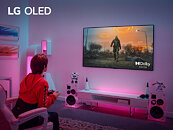TheLostSwede
News Editor
- Joined
- Nov 11, 2004
- Messages
- 17,906 (2.43/day)
- Location
- Sweden
| System Name | Overlord Mk MLI |
|---|---|
| Processor | AMD Ryzen 7 7800X3D |
| Motherboard | Gigabyte X670E Aorus Master |
| Cooling | Noctua NH-D15 SE with offsets |
| Memory | 32GB Team T-Create Expert DDR5 6000 MHz @ CL30-34-34-68 |
| Video Card(s) | Gainward GeForce RTX 4080 Phantom GS |
| Storage | 1TB Solidigm P44 Pro, 2 TB Corsair MP600 Pro, 2TB Kingston KC3000 |
| Display(s) | Acer XV272K LVbmiipruzx 4K@160Hz |
| Case | Fractal Design Torrent Compact |
| Audio Device(s) | Corsair Virtuoso SE |
| Power Supply | be quiet! Pure Power 12 M 850 W |
| Mouse | Logitech G502 Lightspeed |
| Keyboard | Corsair K70 Max |
| Software | Windows 10 Pro |
| Benchmark Scores | https://valid.x86.fr/yfsd9w |
Rumours are starting to circulate about LG and Samsung's OLED plans for 2022 and we might get a first preview come CES in January. For those hoping to get an OLED computer screen at a reasonable price it seems like you might have to wait a bit longer, unless you'd be ok with using a TV as your computer display.
LG is said to be launching a 42-inch version of its C series of OLED TVs and it should retain or improve on the features of its current C series. The model name should be OLED42C2xxx and it's expected to retail for less than the current 48-inch CX and C1 TVs. There will obviously be larger sizes available too, including the current 48-inch size, which is also said to be available in the lower cost and lower spec A2 series. As for the exact spec, we'll have to wait until CES to find out, but HDMI 2.1, HDMI-VRR and possibly either or both of AMD's FreeSync Premium Pro and Nvidia's G-Sync compatible might be part of the package.

Samsung is on the other hand said to be working on a 34-inch QD-OLED computer monitor, alongside 55 and 65-inch QD-OLED TVs. Even less is known about these products, but all the products have apparently already gone into mass production and are expected to be on display at CES. Note that QD-OLED is not the same as QLED, although both display types are using Quantum Dot technology.
View at TechPowerUp Main Site
LG is said to be launching a 42-inch version of its C series of OLED TVs and it should retain or improve on the features of its current C series. The model name should be OLED42C2xxx and it's expected to retail for less than the current 48-inch CX and C1 TVs. There will obviously be larger sizes available too, including the current 48-inch size, which is also said to be available in the lower cost and lower spec A2 series. As for the exact spec, we'll have to wait until CES to find out, but HDMI 2.1, HDMI-VRR and possibly either or both of AMD's FreeSync Premium Pro and Nvidia's G-Sync compatible might be part of the package.

Samsung is on the other hand said to be working on a 34-inch QD-OLED computer monitor, alongside 55 and 65-inch QD-OLED TVs. Even less is known about these products, but all the products have apparently already gone into mass production and are expected to be on display at CES. Note that QD-OLED is not the same as QLED, although both display types are using Quantum Dot technology.
View at TechPowerUp Main Site










